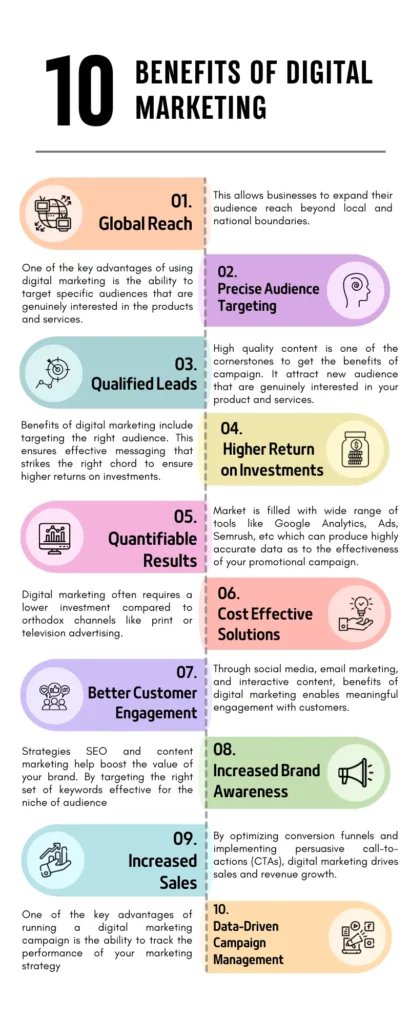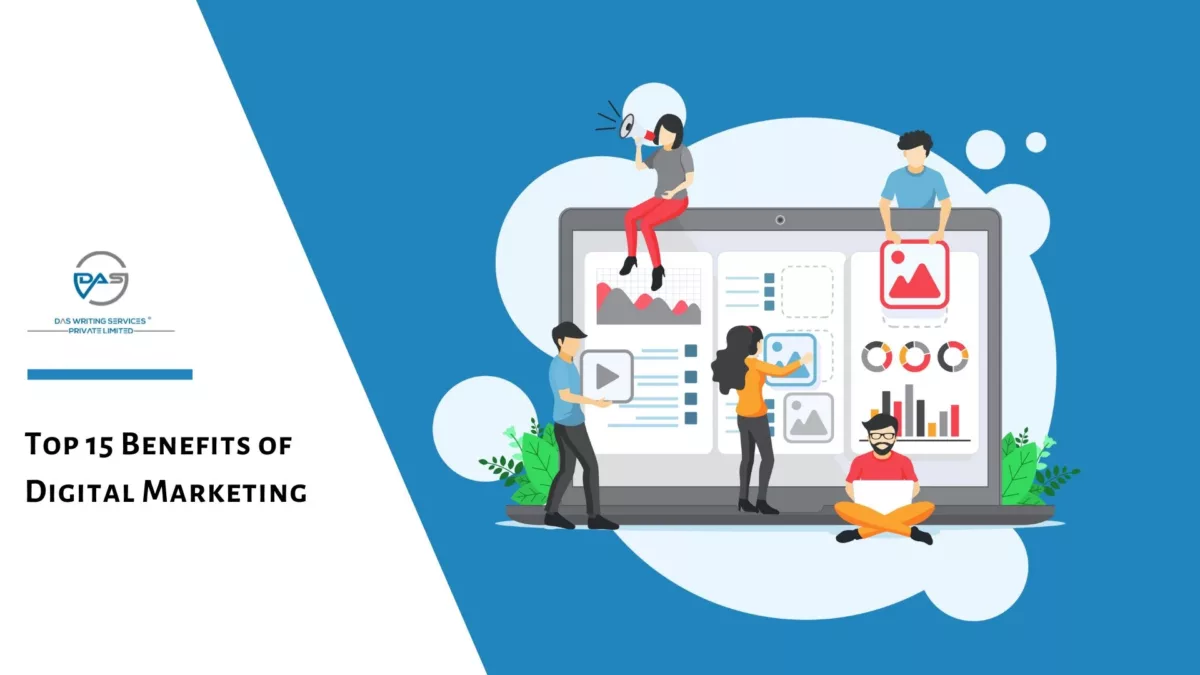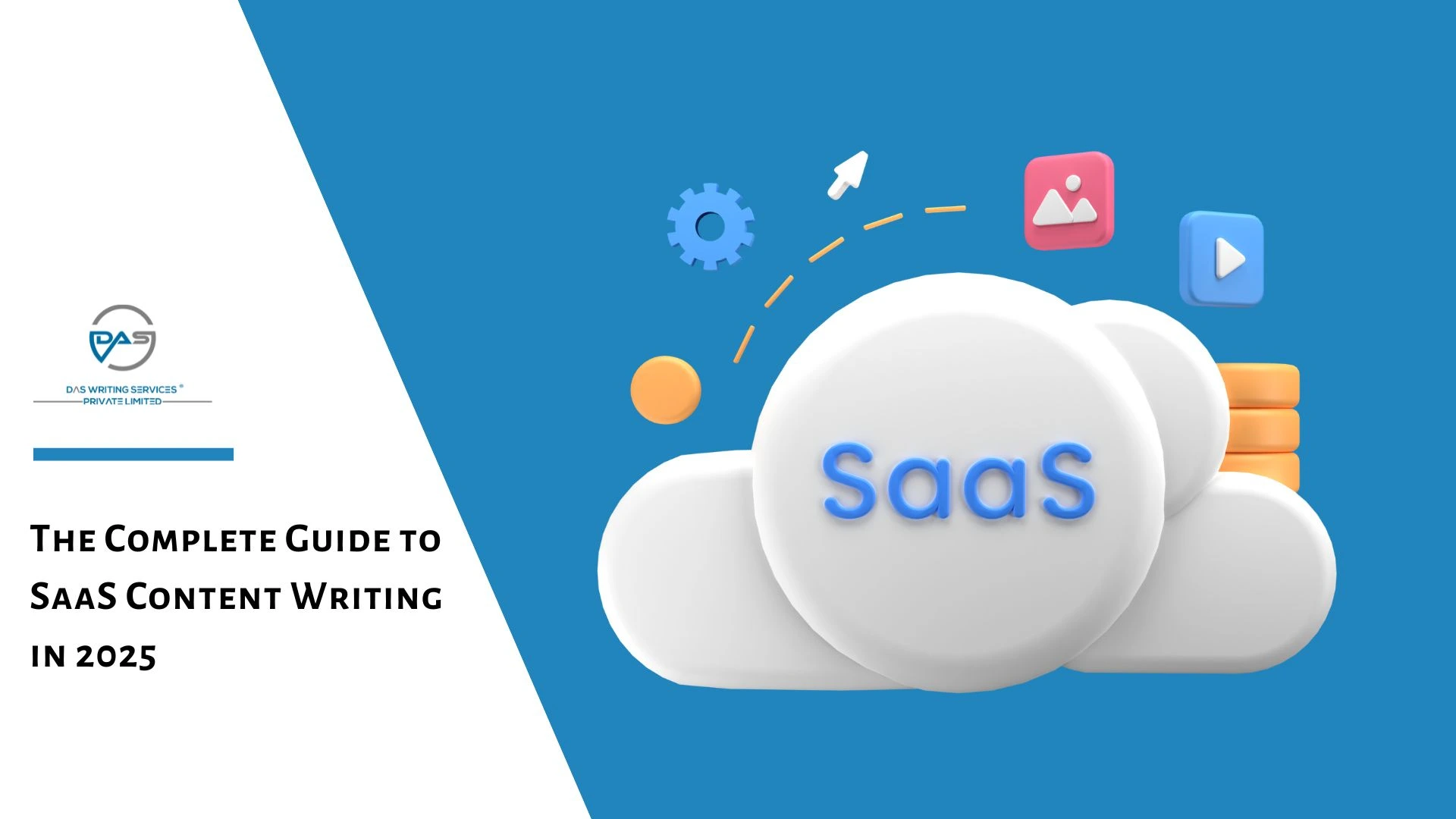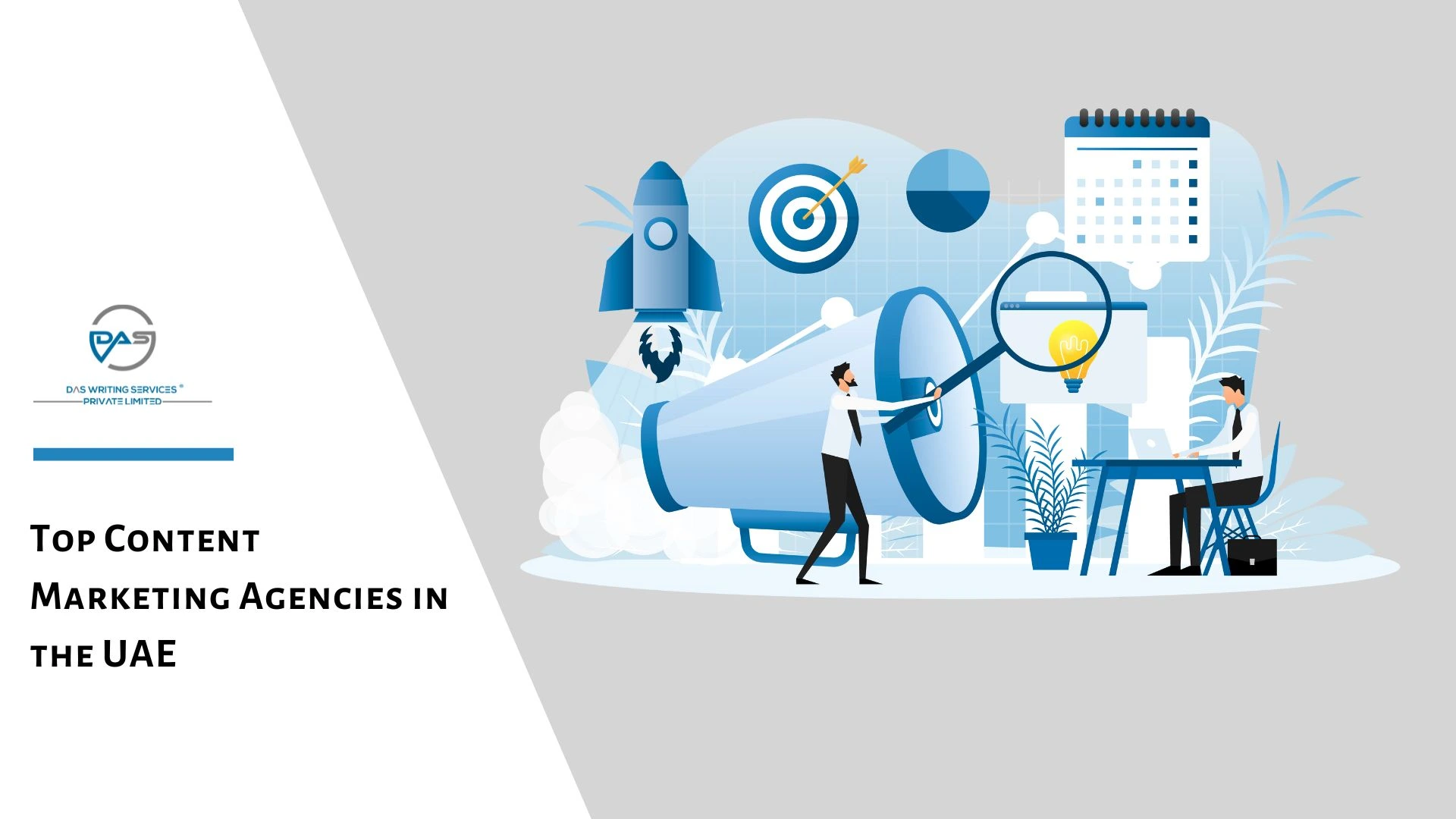From driving consistent traffic to tracking measurable impact, using digital marketing offers quantifiable benefits for businesses trying to target new market segments. While a strong online presence is non-negotiable for all businesses, using it for marketing depends on your goals and audience.
If you are trying to scale your operations and drive more customers to the business, you must take advantage of the several benefits of digital marketing. From offering a virtual platform to connect with people, today the internet shapes and influences public opinion like nothing else. Online marketing strategies can effortlessly position you to the right audience group that needs your expertise and solutions.
Compared to other traditional marketing activities – digital marketing gurantees 3x faster and precision outcome. That explains why most established businesses turn to the internet for marketing. If you too are exploring online marketing potential, then reach out to us. We can put you ahead of your competitors by establishing you as a thought leader in the industry. Interested? Click below!
Know More: Top 15 Digital Marketing Tips for New Businesses
What is Digital Marketing?
Digital marketing is all about using online marketing techniques like SEO, PPC, Social Media etc. to promote a brand’s products and services through internet channels. These channels include websites, search engines, social media platforms, email, and mobile apps.
Digital marketing campaigns use a series of tools like online blog posts, social media marketing, influencer marketing, newsletters, PPC, targeted ads and so on to draw customers. For a business trying to attract customers online, digital marketing can help you scale by offering consistent inbound traffic at lower costs. Typically, digital marketing has a lower cost-per-acquisition, allowing up to 2000% ROI for SEO (where $1 investment can generate up to $22) and 3x increased lead generation for content marketing.
With its versatile and cost-effective solutions, it is of little surprise that many brands transitioned to a digital-only marketing strategy. However, it is important to note that any kind of marketing campaign, be it traditional or digital marketing, can prove to be a cost intensive practice without a proper strategy for conversion.
Know More: What are the Differences between Traditional Marketing vs Digital Marketing?
Top 15 Benefits of Digital Marketing
Competitive ROI and measurable results are the prime reason why digital marketing is dominating marketing campaigns of all major brands worldwide. While of course there are exceptions where traditional marketing works better, digital marketing produces quick results and cost-effective performance.

It results in marketers enjoying a whole set of perks and advantages in their online marketing campaigns. The following are some of the potent benefits of digital marketing that you can look out for in your marketing campaigns:
1. Global Reach
Almost 87% of mobile users have a smartphone i.e. there are more than 5 billion active smartphone users. That is the scope of digital marketing and more! All you need is a proper strategy that can guide and nurture a user through their journey to take the many advantages of digital marketing.
It enables businesses unparalleled potential to scale and create a robust presence in the industry. In comparison, traditional marketing strategies can be highly expensive when trying to tap into a new area. Also, running long-term campaigns with traditional methods turns out to be extremely resource-intensive which ends up creating a lot of pressure.
2. Precise Audience Targeting
One of the key benefits of digital marketing for businesses is the ability to target specific demographics and audiences that are genuinely interested in the products and services.
Social media ad campaigns, influencer marketing and SEM (search engine marketing) allow businesses to reach audiences with targeted keywords.
Coupled with effective content management that efficiently addresses the pain points of the audience, digital marketing gives seamless opportunity. Tools like Google Ads further contribute to this process whereby businesses can tailor their marketing tactics to resonate with the right audience, increasing the potential for conversions.
3. Qualified Leads
High quality content is one of the cornerstones to get the benefits of digital marketing campaign. Because apart from engaging the existing customers, value driven content tends to attract new audience that are genuinely interested in your product and services.
As a result, content marketing and email campaigns produce 3x more conversion-ready leads at 62% less cost. With precise content and reinforced communication digital marketing has become the default tool for conversions.
In comparison, a lot of traditional marketing strategies involve a hit-or-miss approach where many leads turn out to be cold and ineffective.
4. Higher Return on Investments
As discussed in the previous point, benefits of digital marketing include targeting just the right audience. This ensures consistent and effective messaging that strikes the right chord to ensure higher returns on investments.
Compared to the traditional marketing method, the digital strategy allows customization as per the needs and requirements of the audience. With its ability to track and measure results in real-time, businesses can optimize their campaigns for maximum effectiveness, thereby maximizing their ROI.
5. Quantifiable Results
Unlike conventional marketing practices, where gauging success can be challenging, digital marketing benefits from comprehensive analytics and reporting tools. The market is filled with a wide range of tools like Google Analytics, Ads, Semrush, and Meta Business Suite which can produce highly accurate data as to the effectiveness of your promotional campaign.
With the complete suite of tools, businesses can track metrics such as website traffic, engagement rates, conversion rates, and more. This allows companies to track the effectiveness as well as to identify the pitfalls of their campaigns.
6. Cost-Effective Solutions
One of the benefits of Digital marketing often requires a lower investment compared to orthodox channels like print or television advertising. With a host of strategies like organic search traffic optimization, local SEO, social media, and email marketing, much of the digital marketing measures are essentially free of cost.
And of course, measures like PPC and Google Ads also turn out to be cost-effective as it utilizes a results driven approach. As per the strategy, you pay only for the amount of results that you receive.
This makes digital a cost-effective option for businesses of all sizes, especially startups and small businesses with limited budgets. Especially content marketing is known to offer 5-10x ROI and when driven by SEO, organic content is responsible for driving 52% of B2B revenue.
Want the same for yourself? Start with a custom sample today!
7. Better Customer Engagement
Through social media, email marketing, and interactive content, benefits of digital marketing enables meaningful engagement with customers.
With helpful content that addresses the pain points of the customers and solves their problems, businesses can actually get closer to their customers and engage them by showcasing an empathetic voice.
This two-way communication not only builds brand loyalty but also provides valuable insights into customer preferences and behaviours.
8. Increased Brand Awareness
Strategies like search engine optimization (SEO) and content marketing help boost the value of your brand. While content marketing increases brand awareness by up to 11%, better social media visibility encourages 77% consumers to take an action. By targeting the right set of keywords effective for the niche of audience, companies can ensure the repeated appearance of their brand name to the target group.
This ensures renewed awareness about the brand to the target group. By using various channels, digital marketing produces holistic results that keep your brand name and value fresh and relevant.
9. Increased Sales
By optimizing conversion funnels and implementing persuasive call-to-actions (CTAs), digital marketing drives sales and revenue growth. This underlines the importance of online marketing.
E-commerce platforms, in particular, benefit from digital marketing strategies that streamline the purchasing process and encourage people to take immediate action with exciting offers.
10. Create a Niche in the Industry
To survive in a competitive business landscape having a robust and distinguished position in the market is essential. Whether it is through value-driven blog posts or informational guides on a topic – helpful content is the cornerstone to stand out from your competitors in the business.
Benefits of digital marketing allow businesses to carve out a unique niche in their industry by targeting specific market segments or addressing niche interests. This differentiation sets them apart from competitors and establishes them as industry leaders.
11. Efficient Local Reach
From finding local grocery stores to getting the contact details of the carpenters near you, people often rely on Google to find local businesses. That explains why local searches constitute 46% of total Google searches.
One of the much-coveted benefits of digital marketing is its ability to customize messaging to target people from a specific location and area. With effective targeting, localized digital marketing operations help produce better conversions.
For businesses targeting local customers, digital marketing offers highly efficient and targeted strategies. Local SEO, online directories, and geo-targeted advertising help businesses connect with customers in their locality, driving foot traffic and assured sales.
12. Data-Driven Campaign Management
One of the key advantages of running a digital marketing campaign is the ability to track the performance of your marketing strategy. With a series of tools available at your disposal, marketers can harness its potential to judge the utility of a campaign.
With periodic reports and data tracking, business owners can make informed decisions about the effectiveness of a digital marketing campaign. By analyzing user behaviour, preferences, and demographics, businesses can refine their strategies and allocate resources more effectively.
13. Flexible & Versatile Strategies
Unlike traditional marketing, digital marketing allows for rapid iteration and adaptation of strategies based on real-time feedback. As mentioned before, it allows the adoption of data-driven policies.
Further, strategies like A/B testing help run multiple versions of the same offers and promotions to judge user’s reactions and responses. This flexibility enables businesses to stay agile in response to changing market dynamics and consumer trends.
14. Create Loyal Customers
Marketing is not only about closing sales. The primary aim of marketing is establishing a connection between a business and its customers. The same is achievable more efficiently through content-driven digital marketing strategies.
By delivering personalized experiences and consistent messaging across digital channels, businesses can cultivate long-term relationships with customers. Loyalty programs, targeted promotions, and exceptional customer service further enhance customer loyalty and retention.
15. Accurate Buyer Personas
Through data collection and analysis, benefits of digital marketing allow businesses develop accurate buyer personas – detailed profiles of their target audience. This facilitates an in-depth understanding of the customers and their likes and dislikes.
Understanding customer demographics, preferences, and pain points allows a business a competitive advantage over others. Not only does it create a stronger bond with the target group but also lets a brand dominate the market with customized strategies. This enables businesses to tailor their marketing efforts for maximum impact.
Know More: What is the Role of Content Writing in Digital Marketing?
7 Types of Digital Marketing Strategies Proven to Scale Your Business
While there are many digital marketing tools, not all of them may be useful if you are trying to scale. For instance, a footwear brand will get little ROI if they choose email marketing to promote their product – rather social media will be more effective for them. You get the drift, channels and strategies differ in terms of industry and target audience. When it comes to choosing the right digital marketing channels, it primarily depends on the data about the target user preferences. You can choose a few from the following for an experimental campaign. Based on outcome, you can may tweak the budget later.
1. Search Engine Marketing (SEM)
Search Engine Marketing (SEM) is distinct from SEO, as it focuses primarily on paid advertising that appears in search engine results pages (SERPs). These advertisements, often displayed at the top or side of the SERP, are triggered by specific search terms entered by users. Advertisers incur costs each time someone clicks on their ad. The leading platforms for SEM are Google Ads and Bing Ads.
The effectiveness of SEM is underscored by the fact that 68% of online interactions begin with either organic or paid search results. By positioning your brand prominently where most online activities start, you can effectively draw in more potential customers to your website.
2. Social Media Marketing
Social media marketing focuses on organically promoting your business across various social platforms. It’s not merely a channel for advertising; it also enables direct, one-on-one interactions with your most engaged followers, enhancing customer relationships.
Given the pervasive nature of social media, businesses need to maintain an active presence on multiple platforms. Currently, Facebook, X, YouTube, Instagram and TikTok dominate the landscape. However, successful social media marketing requires more than just setting up a few accounts.
Many platforms offer features that let users make purchases directly through the app. While driving sales is important, the primary objective for many companies is to foster conversations with their audience. Additionally, social media serves as an excellent avenue for amplifying your content marketing efforts.
To enhance your social media reach and effectiveness, consider these best practices:
- Understand Your Audience: Identify their preferred platforms and interests.
- Create Compelling Content: Focus on producing high-quality and engaging posts.
- Timely Engagement: Aim to respond to comments and inquiries within 24 hours.
- Maintain Consistency: Stick to a regular posting schedule to keep your audience engaged.
- Optimise Posting Times: Share content when your target audience is most active.
- Consider Professional Help: Hiring a social media manager can streamline your campaigns.
Ultimately, the goal of social media marketing is to foster engagement with your followers. The more you inspire interaction with your content, the greater the likelihood that your audience will share it, potentially attracting new customers in the process.
3. Pay Per Click (PPC)
Pay-per-click (PPC) advertising is a digital marketing strategy where advertisers pay a fee each time their ad is clicked. This model ensures that businesses only incur costs when users engage with their ads, making it distinct from other advertising methods that may charge based on impressions. PPC can be utilized on both search engines and social media platforms, providing flexibility in reaching audiences.
Google Ads stands out as the leading PPC platform for search engine advertising, while Bing Ads follows as a popular alternative. Additionally, platforms like Facebook Ads, YouTube Ads, and Amazon Ads offer valuable opportunities for PPC campaigns.
To maximize the effectiveness of your PPC efforts, it’s essential to optimize your campaigns. Here are some key strategies:
- Enhance Ad Quality: Focus on improving your Quality Score in Google Ads to boost ad performance.
- Satisfy Target Audience’s Needs: Craft ads that address the specific challenges or interests of your target audience.
- Landing Page Optimization: Ensure your landing pages are high-quality and relevant to the ads.
- Smart Bidding: Employ bidding strategies that balance cost effectively—aiming neither too high nor too low.
While PPC can deliver quick results, it also comes with potential challenges. Costs can fluctuate significantly, and without a well-structured plan, expenses can escalate quickly. It’s crucial to understand the intricacies of bidding on your chosen PPC platform and to monitor relevant metrics to assess return on investment (ROI).
4. Content Marketing
As more than 80% businesses actively create one or another form of content – all up and coming businesses require an active content marketing strategy to maintain their relevance in the industry. Whether you are targeting consumers or businesses – creating visual and textual content allows you to engage users and retain users by offering something of value.
The process is pretty straightforward, you create content based on the pain points and interests of your audience groups. By creating personalized content for the target audience you are likely to notice 3s+ increase in user session time on an average. This is the key factor that makes content the most sought after strategy for brands like ClearTax, Acko, Star Health Insurance etc. Check out our esteemed clients below.
5. Native Advertising
Native advertising refers to a form of paid promotion designed to blend seamlessly with the content of the platform where it appears. The primary objective is to create ads that resemble regular content, making them less recognizable as advertisements. By integrating into their surroundings, native ads aim to engage users without drawing attention to their promotional intent.
The rise of native advertising can be attributed to growing scepticism among consumers towards conventional paid ads. Many shoppers perceive these traditional ads as biased and often disregard them, prompting advertisers to seek alternatives that can improve conversion rates.
To counteract consumer scepticism, native ads focus on delivering entertaining or informative content while minimizing their overtly promotional aspects. For instance, a native ad might be crafted to resemble a typical post on social media, or it could take the form of a sponsored article on a news website.
However, creating effective native ads requires a careful balance, as they must still maintain transparency about their advertising nature. To achieve this, native ads typically include disclosures such as “sponsored” or “promoted,” ensuring that users understand they are engaging with paid content. Despite being advertisements, users often respond more favourably to native ads because they feel less disruptive compared to traditional advertising formats.
6. Email Marketing
Email marketing is a direct marketing strategy that involves communicating with customers through carefully crafted email messages. Despite being over twenty years old, email remains one of the fastest and most effective methods for reaching your audience. To stand out in crowded inboxes, your emails must be engaging, relevant, informative, and entertaining.
There are various types of emails that businesses typically utilize in their marketing efforts, including:
- Blog Subscription Newsletters: Regular updates that share new blog content with subscribers.
- Welcome Emails: Messages sent to greet and onboard new customers.
- Promotional Emails: Special offers or promotions tied to holidays or events.
- Post-Purchase Follow-Ups: Emails that provide customers with tips, tricks, and best practices after making a purchase.
By leveraging these different formats, businesses can effectively connect with their audience and enhance customer engagement.
7. Influencer Marketing
Influencer marketing is a digital strategy employed by brands to advertise their products or services through well-known content creators. This approach shares similarities with affiliate marketing, as it allows brands to leverage an influencer’s existing audience, which typically has a built-in trust for the influencer’s recommendations.
Although influencer marketing is often associated with B2C sales of consumer products, it can also be effective for B2B companies offering items like office supplies or software subscriptions. The key is to collaborate with influencers who resonate with your target audience.
Unlike affiliate marketing, influencer marketing typically does not involve sharing profits. Instead, brands usually compensate influencers with a fixed fee for their promotional efforts. This means that influencers receive payment regardless of the sales generated from their endorsements.
Know More: Top 13 Digital Marketing Channels in 2025
Takeaway
If you think about digital marketing vs traditional marketing, digital marketing offers unparalleled advantages. It is comparatively cheaper and allows easy customisation and adaptability as per requirements.
While traditional marketing still has its place, the shift towards digital channels is undeniable in today’s tech-savvy consumer landscape.
The benefits of digital marketing in 2025 are vast and multifaceted and it allows businesses to thrive in an increasingly digitalized world. By leveraging the power of digital channels, businesses can expand their reach, engage with customers, drive sales, and ultimately achieve sustainable growth and success.
Frequently Asked Questions
1. What is the use of digital marketing?
Digital marketing is used to promote products or services through the internet via websites, social media platforms, search engines, email, and mobile apps.
2. How do consumers benefit from digital marketing?
Consumers benefit from digital marketing through personalized experiences, access to relevant information, convenient purchasing options, and engaging interactions with brands.
3. What are the types of digital marketing?
Types of digital marketing include search engine optimization (SEO), social media marketing, content marketing, email marketing, pay-per-click (PPC) advertising, influencer marketing, and affiliate marketing, among others.
4. How important is digital marketing today?
Digital marketing is crucial in today’s digital-centric world as it allows businesses to reach and engage with their target audience effectively, drive sales, and stay competitive in the market.
5. Who uses digital marketing?
Businesses of all sizes and industries use digital marketing to promote their products or services, connect with customers, and achieve their marketing objectives. From startups and small businesses to multinational corporations, digital marketing is a ubiquitous tool in the modern business landscape.
Subhodip Das is the founder and CEO of Das Writing Services Pvt. Ltd. He has an experience of 12 years in the field of Digital Marketing and specialises in Content Writing and Marketing Strategies. He has worked with well-established organisations and startups helping them achieve increased Search Engine Rank visibility. If you want to grow your business online, you can reach out to him here.



Leave a comment
All comments
Aditi Singh
I thought digital marketing was just about social media. This blog opened my eyes to its vast scope, including SEO and email marketing and the many advantages.
Anurag Thakur
This article made it easier to decide on a marketing strategy for my business. Clear and concise explanation of digital marketing's various advantages. The table was a great touch!
OrangeDigiTech
This article on content marketing is fantastic. Your tips are spot-on and easy to implement.
Ankit
Highly insightful blog, recommending everyone to read
Astolfo Ignatov
Thanks for sharing. I read many of your blog posts, cool, your blog is very good.
Arghish Das
Great article! It's really helpful for anyone looking to learn about digital marketing. I especially liked the part about reaching a global audience.
Priyanshi Sathiya
This article does a great job highlighting the key advantages of digital marketing. It's a must-read for businesses aiming to grow their reach and connect with the right audience online.